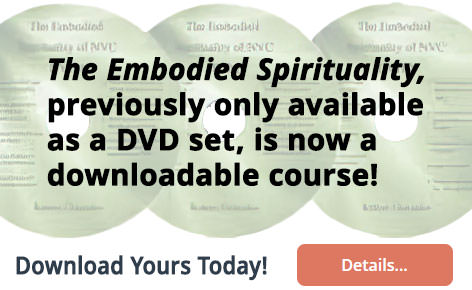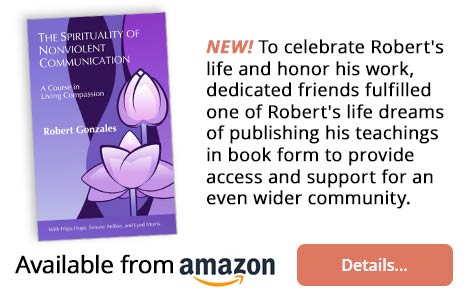

Welcome to the Robert Gonzales Training Legacy. Here you can learn more about Robert and the powerful teachings he dedicated his life to. NVC Academy is proud to house and share with you the complete body of his life's work. We invite you to explore, learn, and help keep his legacy alive!
Robert's passion was in the spirituality of the Nonviolent Communication (NVC) process. He saw NVC both as a process that helps people connect more authentically with themselves and others, and as a spiritual practice and way of living. The worldwide NVC community mourned when Robert died in 2021. He left behind a legacy of work that emerged from a lifetime of inquiry into the intersection between spirituality and human communication. More about Robert.
Article
3-5 minutes
Anger can result in violence or in a movement towards positive change. We can see this happen in the push for racial justice. When you perceive anger as a form of violence your nervous system becomes activated. Your perspective narrows and old conditioning can take over leading to overwhelm, defensiveness, hatred, or violence. Read on for four ways to to respond to our own or others' anger in a way that mobilizes desired change.
Details...Article
3 - 5 minutes
When we're received with resonant understanding painful moments can lessen their charge and became part of the whole tapestry of life -- important but no longer able to hijack us into the eternal re-run of pain. When held this way, we can touch the memories with our attention the way one touches a newly repaired tooth with the tongue, searching for the old roughness, the old wound, but not finding it.
Details...Article
3-5 minutes
Attraction to others is neither good nor bad. Although it's pleasurable it doesn’t necessarily help with wise discernment. When it arises, it's up to you to engage in wise discernment about how you manage it. This guide provides practices and points of focus to engage your own attraction in a way that holds more choice about what will meet needs for yourself and others, and what role attraction plays.
Details...Article
9 - 14 minutes
One way to understand trauma is it means we got a blow greater than our nervous system can tolerate – then we move into hyperarousal, and then hypoarousal or dissociation. This cycle can continue long after. Here, we're not able to fully process emotional cues, information, our body, and others. It's important we consider re-writing the cultural paradigm of separation so that our trauma doesn't get marginalized.
Details...Article
7 - 11 minutes
When something happens that we don't like no amount of resentment nor magical thinking will make it disappear. Instead, we can mourn to dissolve our own resistance, resentment, and numbness of resignation. Mourning can allow us to feel pain with acceptance, and without needing to be okay with what happened. Acceptance can bring us to a place where even all the anguish in the world is fully, part of life.
Details...Article
12 - 18 minutes
When someone expresses upset about our actions, and we focus on our intention being seen and understood (e.g. "I didn’t mean to hurt you”) it doesn't support the speaker in being heard more deeply with care. Here we'll explore this dynamic in a way that supports more clarity and the possibility of greater personal liberation. Read on for more.
Details...Article
5 - 8 minutes
Working for racial justice is a shift in perspective—a shift in understanding and empathy that leads to a change in our actions: to listen instead of talk, to follow instead of lead, to yield rather than dominate. And to accept that I will continue to mess up. Part of working to undo racism is having the humility to know when our own understanding is limited. Read on for more this, and how it relates to meditation -- plus personal and collective liberation.
Details...Article
15 - 23 minutes
The existing unequal risks and impacts people of certain race, class and identities face in society is magnified in these strenuous times -- especially with things such as illness, financial well being, discrimination, attacks, and death. As responsive NVC practitioners we can stand in solidarity with those who are differentially impacted. Read on for this, and additional ways to spot common pitfalls of doing so.
Details...Article
7 - 11 minutes
It’s essential to give ourselves time to grapple with the complex feelings surrounding the brutality of state-sanctioned racism and violence. But if all we do is reflect and attend to our emotions we fail to show up, where and when it counts. So let's not perpetuate the violence by standing idly. Instead, here's ten things you can do to move into concrete action to address the continued, untenable, and horrific violence of racism. A list of resources is included.
Details...Article
23 - 34 minutes
Amidst racial violence, there are things that NVC can offer. And there are places where NVC culture needs to be more vigilant. Here are examples of where, amidst incredible loss and pain, "allies" and communities commonly (and often unknowingly) create false equivalences, minimization and re-injure those who've been historically marginalized -- even when they offer empathy, or aim to stay "safe". Read on to cultivate greater understanding and ways to respond differently.
Details...

